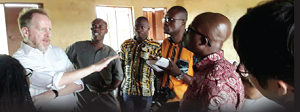
Poverty, inequality lead to instability — Development partners
Ghana's development partners have raised concerns about poverty and issues of inequality and stated that if they are not addressed, they can become conduits for extremism and instability in the country, particularly in the northern part of Ghana.
According to the partners, Ghana must put in place pragmatic measures to address the increasing level of poverty and inequalities in northern Ghana which could be part of the means for young people to join extremist groups which were gaining notoriety in the West African sub-region.
Advertisement
The Chairman of Ghana's Development Partners Group, Mr Philip Smith, who is also the Country Director of the United Kingdom Department for International Development (DFID), raised the concerns in an interview with journalists in Tamale last Wednesday.
He had led a delegation from the group to inspect some projects funded by DFID and other development partners in the Northern Region.
Security
He observed that poverty was a serious threat to security in the country, especially in northern Ghana, citing the recent attack on a church in Burkina Faso by extremists as a clear example.
"We are here to listen and understand the development challenges and how best we can partner the government and the private sector to address them, although already we have made some investments in this area," he noted.
Mr Smith stated that security was clearly an issue with the situation in Burkina Faso, hence Ghana must address the issue of poverty in northern Ghana which if left unchecked could be part of a means for extremism and instability.
He expressed worry about the increasing rate of poverty in that part of the country and called on the private sector to closely work with the government to help bridge the development gap between the north and the south.
Mr Smith made reference to a recent data released by the Ghana Statistical Service (GSS) which indicated that the poverty levels in the northern part of the country and inequality gaps in the country had widened.
"We have still got poverty rate at 50 per cent to 60 per cent in Upper West and Upper East regions," he stated.
Ghana Beyond Aid
Mr Smith pledged the commitment of the donors towards supporting the government's Ghana Beyond Aid strategy to push the development of the country forward.
"Ghana Beyond Aid does not mean no aid, the government has been quite clear about that. There is no more a donor-recipient relationship but this is about partnership between Ghana government and our respective governments," he said.
Threats
Meanwhile, some extremists groups have begun luring some young people in the Northern Region into their fold in the wake of rising extremist threats in the sub-region.
The high poverty level in that part of the country makes the youth there an easy target for extremist groups.
A young man in the Tamale metropolis related how he was contacted by the Islamic State of Iraq and Syria (ISIS), a Salafi jihadist militant group, through social media (Facebook) and was to join the group for $3,500 a month.
“They contacted me through Facebook several times but I declined the offer. They always call to ask whether I have now made up my mind to join them," the 25-year-old man narrated.



